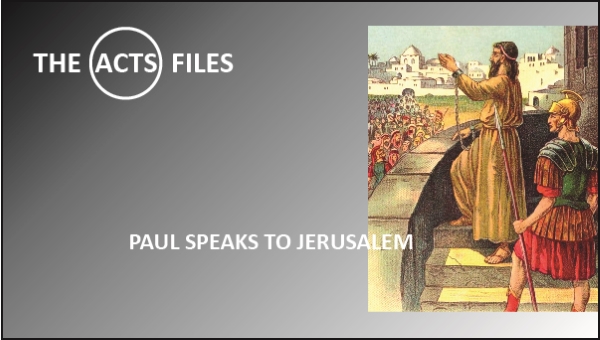By Tyson Thorne

Upon reaching the Roman’s fort Paul asked if you could speak to the commanding officer, who evidently wasn’t well versed in Hebrew. Upon his consent Paul asked the officer, in Greek, if he would prefer to talk in the Greek language. This surprised the officer who, due to the confusion caused by the mob, thought that Paul was a terrorist. Apparently Roman intelligence knew that the terrorist, a member of the famed Sicarii assassins, did not speak Greek.
The Sicarri, or Siqariqim, were a Jewish splinter group of zealous Hebrews who believed that the nation was to be ruled by “God alone”. While they certainly didn’t like Roman rule, they liked “collaborators” even less. Any Jewish official who consented to the Roman’s rule was deemed a collaborator and made their “hit list”. Upon receiving the assassination approval, members would follow the target through the crowded city and, using a short bladed knife (called a Sicarrii, hence their name) that could be easily hidden in their cloak, they would stab the collaborator and slip away in the confusion of the crowd. Sometimes the assassin may remain at the scene to help spread panic and misinformation about who perpetrated the act before escaping.
Paul cleared up the matter of his identity and asked to speak to the mob outside. Permitted to do so, Paul took his place, silenced the crowd and addressed them in the more familiar Aramaic language. The fact he addressed the crowd in a dialect of Hebrew caught their attention and they responded by quieting down.
Paul begins to inform the crowd of his Jewish upbringing. Having come from a famous Jewish city (Tarsus) he moved to Jerusalem where he studied under Gamaliel, a most highly regarded Jewish scholar. Gamaliel had an enormous impact on Judaism and his teachings may be found in the Mishna to this day. He was given the highest possible title for a teacher of the Law, Rabba. This association brought immediate respect.
The crowd listened intently to Paul’s testimony, about how he had met Jesus while carrying out orders from the high priest. I can imagine many of them shifting from one foot to the other, uncomfortable to hear such things from a scholarly man. And when he mentions that God told him to take the message about their Messiah to the Gentiles, they lost their patience and began to shout him down, calling for his execution.
For Paul’s safety and to remove the possibility of a riot, the commanding officer (a chilliarch -- commander of 1,000 troops), ordered Paul back inside. It was this officer’s duty to get to the bottom of the matter, so he ordered Paul to be questioned using “enhanced interrogation” methods. In that day a man was tied to stalks and then lashed with a whip that had many braided ends, or thongs, causing multiple lacerations with each strike.
Paul was reprieved of this once he made his Roman citizenship known. Roman citizenship could be gained in only a few ways. One may be born from a Roman citizen (making it a birthright), one could buy their citizenship (usually through bribery), or one could earn such high regard and respect through service on the battlefield that it may be gifted by Caesar. With citizenship came certain rights. The Roman was to be respected always, even when accused. Should a Roman be arrested he is not to be harmed or even bound before first being tried. Only after a citizen has been tried and found guilty could he be bound and punished according to the law.
The revelation of Paul’s citizenship changed his situation dramatically, and all the guards and soldiers steered clear of him or gave him the respect such a position held. This presented a problem to the commander, who needed to understand why the Jews were so intent on killing this Roman Jew. He would have to find answers another way.
|
|
|
